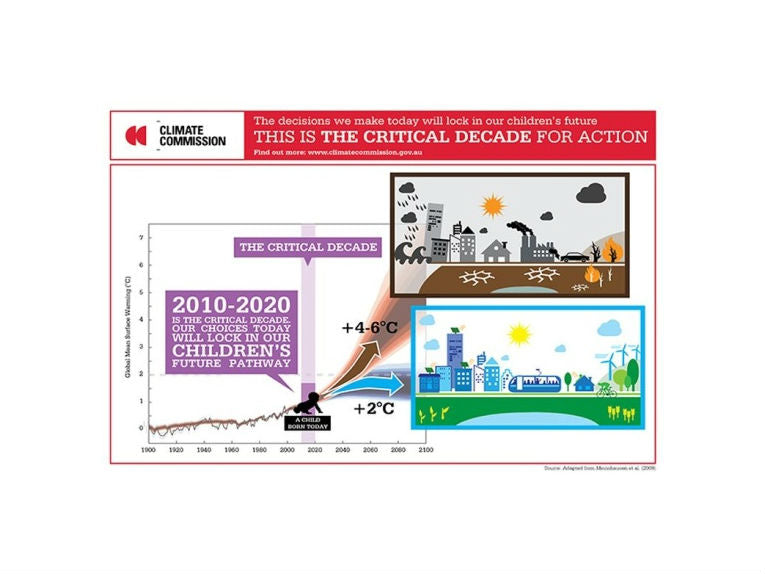The Australians have suffered more than most from climate change problems, with fire and flood dominating their headline news annually. Their Climate Commission produced a report in 2011, "The Critical Decade," delivering a timetable. Now, 2 years in, the report tells how it is. They believe most fossil fuel has to remain where it is to prevent that disastrous scenario of a 2°C temperature rise. Conclusion 5 in this Report states, "The burning of fossil fuels represents the most significant contributor to climate change." All of this when they admit their export of coal from New South Wales to Asia represents a gigantic economic bonus and a useful aid to developing nations.
Globally, the Ozzies have pointed out that the oceans have been busy absorbing almost all of the heat energy (90%) The atmosphere and the land, including ice, store the other 10%. Graphing the ocean heat content since 1955, a 0.1°C rise over the whole 700m top layer took place before 2010. That massive volume of water required so much more energy to increase by that amount than our atmosphere. The atmosphere will warm in the same way, but first the lower sea levels are being warmed right now. 30% of the last decade's warming has been below 700m! Australian scientists are particularly worried about the larger increases in the East Australian Current temperature.
In 50 years, the atmosphere has increased too. Each decade seems to be the hottest ever recorded, with the whole planet equally served, Australia included. Rainfall changes have resulted, with dryness and flooding occurring in new areas. Australia, as a desert environment in part realises that new regions such as the south-west and Tasmania are also becoming drier. Snow and ice have been caused to decrease worldwide, thereby failing to reflect back the radiation they normally would. Regional warming is becoming obvious as the result of that.
Sea level rise results from the melting of land-based ice. All in all the estimated ice loss is 600 billion tonnes every year, with annual increases. The record low (2012) in the floating Arctic ice has been well-recognised and alarms everyone including polar bears. The resultant rise in sea level has been 20cm so far (till 2011) and many cities have been quoted in danger, alongside Queensland and central New South Wales.
Taking up more of that carbon dioxide from the emissions in the atmosphere, the oceans have become more acidic with carbonic acid (by about 30%). Effects on shelled animals are already drastic, and we must fear the worst on corals, molluscs and any planktonic species too. Promising signs of decarbonisation in our economies may be too late for any effect on some of these tragic events, but the discovery of new fossil fuel antics and continued extraction can only worsen this Critical Decade's chances of success. Speed is of the essence. We've got to stop now, not in 10 years' time.
Here is the shorter summary of the work carried out by the Australian Climate Commission, full of useful charts on anything you might want to view!










